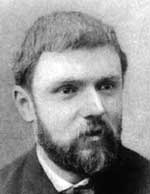Approaching History
IdeasWe have been attending to the data. We have been internalizing the data. No relationships of interest have emerged from the data we have so far processed. We have a notion of where to look, but the "idea" that would connect the dots, or make sense of the figures, has not yet appeared. No "Frontier Hypothesis" has yet suggested itself from our perusal of the land office records. We have gone to some trouble not to drag ideas in with us, and we have become aware of facts and tendencies that the past itself suggested, but we can't yet make sense of those past facts and tendencies. Now what?
Not necessarily anything. There may be no idea there, beyond the fact of the already observed tendencies. Or (people differ in these matters) we may not be equipped to sense the idea amid the tendencies. If there is nothing interesting beyond the fact, or if the fact itself is less extensive than we would have supposed, that itself is information, and can be reported as such. We simply stop there:
Knowledge is knowing when you know, and knowing when you don't. (Analects 2:17)
But maybe more patience is needed. The process of thought takes time too, over and above the process of collecting things to think about. Those with experience in discovery have reported the moments of discovery in ways that suggest the following description of how ideas appear.
The Other Mind
The mind has two levels: an upper mind that you think with, and a lower mind that runs at its own speed, in parallel with the conscious one. Not everyone has this lower level in significant degree; it can to some extent be developed. The lower mind is nothing much to brag about. It is dumb. It works like a computer left on all the time. You load it up with data: everything you can find that might be relevant. Your reading eye, your observing eye, is the optical scanner for this lower mind. The lower mind then operates by mechanically sorting through the data, comparing each item against the others in turn, looking for a connection or a resonance.
When the lower mind finds something of interest, it tries to get the attention of the upper mind, the thing you think with when you know you are thinking. Some conditions are more favorable than others for the lower mind to make contact. The conditions might be summed up this way: they are likelier to obtain when one's sense of physical balance is disturbed. Walking is good, especially when one encounters some novelty on the walk. Walking on a height where one's balance is challenged, or crossing a bridge (Hamilton; see Bell 360), or putting one's foot on the step of a carriage in order to get into the carriage, and steadying oneself in that precarious situation (Poincare; see Bell 547), are typical moments. Even more typical is the moment of falling asleep, when one often has a sensation of losing one's balance (and awakes with a start). Loss of mental equilibrium in sleep, as when sleep is disturbed by dreaming, is another common contact point. Whatever works for you, cultivate it. If you dream well, keep pencil and paper on the nightstand:
Otto Loewi, professor of pharmacology at the University of Graz, awoke one night with a brilliant idea. He reached for pencil and paper and jotted down a few notes. On awaking next morning he was aware of having had an inspiration during the night, but to his consternation he could not decipher his notes. All day at the laboratory in the presence of familiar apparatus he tried to remember the idea and to decipher the note, but in vain. By bedtime he had been unable to recall anything, but during the night to his great joy he again awoke with the same flash of insight. This time he carefully recorded it before going to sleep again. (Beveridge 70)If you are a productive walker, as many authors are, protect your privacy in walking:
I was walking in a certain street on my way home to lunch, in perfectly plain, fine, unromantic autumn weather, when a young, well-dressed man overtook me and addressed me by name. "Hello" I said, and feeling sure that I knew him, I took his arm. Then I said, uncertain, "Who are you?" He said "Oh, I'm nobody. But I wanted to speak to you. I hope you don't mind." He did not guess that he was gravely interrupting creative reflections on my new novel. (Bennett 144f)Not all inspirations work out. Faraday, as we have already noticed, put the failure rate at more than 90%. But compared to nothing at all, this is a high-yield source.
Do what works for you. Make a routine of it. And once you have a routine, remember to take a break from it. As J P Morgan helpfully remarked,
"I can do a year's work in nine months, but not in twelve months."
And then, since disturbing a routine can itself be an unbalancing and thus inspiring experience, do not be surprised if inspirations suddenly come flooding in upon you.
Readings
- Eric Temple Bell. Men of Mathematics. Simon & Schuster 1937
- W I B Beveridge. The Art of Scientific Investigation. Norton 1950
- Jacques Hadamard. The Psychology of Invention in the Mathematical Field. Princeton 1945; rev 1949; Dover 1954
- Arnold Bennett. Journals.
17 Mar 2006 / Contact The Project / Exit to Outline Index Page

